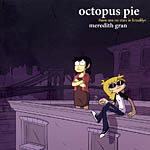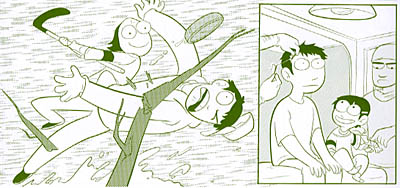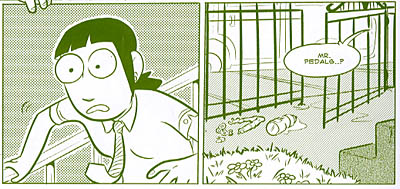 By Meredith Gran
By Meredith Gran
272 pages, green and white
Published by Villard Books
Octopus Pie is one of those online comics that I’d heard the title of (because really, once you hear the phrase Octopus Pie how are you going to forget it?) but never sat down and read. Now that Villard Books has released a collection of the first two years of the strip, though, it seemed like a good a time as any to see just what it’s all about. That said, the biggest mistake you can make as an Octopus Pie newbie has got to be the one I made: don’t read it all at once.
Like so many classic sitcoms from back in the day, Octopus Pie uses the set-up of two roommates who are polar opposites; Eve, the uptight and sarcastic main character, and Hanna, her slacker/stoner pre-school classmate. What we end up with is a back and forth that will quickly grow familiar; a problem arises, Hanna takes the easy-going road, Eve works herself up into a tailspin. Stolen bicycles, potential boyfriends, ex-boyfriends, ice skating; the pattern is there, each time. The differences (aside from the window dressing) come for if Hanna ends up getting worked up too, or if Eve occasionally dials down her anger and frustration. Still, though, it’s hard to ignore that each story arc has more or less the same rise and fall.
 Where Octopus Pie does succeed is in some of the snappy dialogue, and the occasional moments of surprise. Eve turning out to be an excellent ice skater, or a secret geek are some of the high points of the strip, because it gives her a little more depth that up until that point she’s lacking. Considering she’s the protagonist of the strip, this general lack of three dimensionality can get a little frustrating at times. I do like Gran’s dialogue choices, though; the roommates both sound like real people, even when delivering snappy comebacks and withering put-downs to other characters (or each other). So often that kind of dialogue sounds forced or phony, but I think it’s Gran’s real strength that it doesn’t feel out of the ordinary.
Where Octopus Pie does succeed is in some of the snappy dialogue, and the occasional moments of surprise. Eve turning out to be an excellent ice skater, or a secret geek are some of the high points of the strip, because it gives her a little more depth that up until that point she’s lacking. Considering she’s the protagonist of the strip, this general lack of three dimensionality can get a little frustrating at times. I do like Gran’s dialogue choices, though; the roommates both sound like real people, even when delivering snappy comebacks and withering put-downs to other characters (or each other). So often that kind of dialogue sounds forced or phony, but I think it’s Gran’s real strength that it doesn’t feel out of the ordinary.
 Gran’s art starts out fairly smooth and iconic. It’s nice at a glance because it feels remarkably uncluttered, and Gran gives her characters expressive faces and postures as they go through their various travails and adventures. One thing I did notice the further the book went along, though, is that there’s a certain sameness to the way she draws characters. It’s not a problem when the book is focused on the core cast, because Gran was careful to give each identifying features (hair color, hair cut, gender) to keep them all apart. When a large supporting cast is brought in, though, more often than not some of the secondary characters start blending together. Towards the end of the book, Gran switches from drawing her strip electronically to by hand, and a lot of that smoothness vanishes. It’s strange, because at a glance you’d assume that those chapters were drawn much earlier when she was learning her craft (based on the lack of smooth and crisp lines), but in some ways I think I like this rougher style more. It feels more honest and real, and the lack of the computer-assisted lines means that characters actually have a little more in the way of visual features.
Gran’s art starts out fairly smooth and iconic. It’s nice at a glance because it feels remarkably uncluttered, and Gran gives her characters expressive faces and postures as they go through their various travails and adventures. One thing I did notice the further the book went along, though, is that there’s a certain sameness to the way she draws characters. It’s not a problem when the book is focused on the core cast, because Gran was careful to give each identifying features (hair color, hair cut, gender) to keep them all apart. When a large supporting cast is brought in, though, more often than not some of the secondary characters start blending together. Towards the end of the book, Gran switches from drawing her strip electronically to by hand, and a lot of that smoothness vanishes. It’s strange, because at a glance you’d assume that those chapters were drawn much earlier when she was learning her craft (based on the lack of smooth and crisp lines), but in some ways I think I like this rougher style more. It feels more honest and real, and the lack of the computer-assisted lines means that characters actually have a little more in the way of visual features.
Octopus Pie: There Are No Stars in Brooklyn wasn’t a bad read, but it’s definitely a book you want to dip into casually, one chapter at a time. Read back-to-back, some of the strip’s weaknesses are much more obvious and hard to ignore. In small doses, though, it’s a fluffy but fun read. And considering it’s a comic strip, I’d say those small doses are what Gran had in mind all along.
Purchase Links: Amazon.com | Powell’s Books
